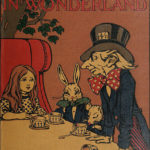The Christian Problem With Magic, Part 1
Christians have a problem with magic. Not all Christians, of course; many Christians are great readers of magic- thick fantasy, and some have even been great writers of it. Still, as a group, Christians have a problem with magic.
thick fantasy, and some have even been great writers of it. Still, as a group, Christians have a problem with magic.
I’ve seen Christians try to ameliorate this problem, and frankly, they make two mistakes. First, they occasionally give off an air of superiority, as if all these fantasy-criticizing philistines are an affront to art and culture and imagination. Secondly, they can miss the point entirely – which is funny, because they’re Christians themselves, and they ought to be able to grasp the Christian objection to fantasy even while they disagree with it.
So let’s go back to the beginning. Where, exactly, does this leeriness in the Christian community toward magic and fantasy come from?
And the answer is: The Bible. The Bible deals repeatedly, and often quite forcefully, with magic and its associated practices of witchcraft, divination, fortune-telling, consulting the dead, attempting any contact or engagement with ‘spirits’, and sorcery. Deuteronomy 18 is probably the most famous passage in this respect; it actually lists the sacrifice of children to idols alongside magical and occultic practices, and sternly warns that because of such “abominations” God would destroy the Canaanites – and, by implication, would also destroy Israel if she, too, became guilty of them.
But Deuteronomy 18 is only the executive summary. Magic and witchcraft recur throughout the Bible, sometimes with considerable color. The Egyptian magicians and sorcerers strengthened Pharaoh in his refusal to let Israel go; they even performed, by their “secrets arts”, some of the same miracles Moses did. Yet they were defeated: when Moses’ staff-turned-snake devoured theirs; when they could not imitate the Plague of the Gnats; when they, unlike God’s people, were afflicted with boils and “could not stand before Moses”.
Nineveh – the “city of blood”, “never without victims” – was “the mistress of sorceries, who enslaved … peoples by her witchcraft.” (Nahum 3)
Babylon was lousy with magic and witchcraft, a fact evident in the Book of Daniel and emphasized in Isaiah 47: “[These calamities] will come upon you in full measure, in spite of your many sorceries and all your potent spells. You have trusted in your wickedness and have said, ‘No one sees me.’ … Disaster will come upon you, and you will not know how to conjure it away.”
Some of the prophecies of Revelation were directed against “Babylon the Great”. This more symbolic Babylon, like the nation Babylon, was  distinguished by – and judged for – bloodshed and magic: “By your magic spell all the nations were led astray. In her was found the blood of prophets and of the saints, and of all who have been killed on the earth.” (Revelation 18:23b-24)
distinguished by – and judged for – bloodshed and magic: “By your magic spell all the nations were led astray. In her was found the blood of prophets and of the saints, and of all who have been killed on the earth.” (Revelation 18:23b-24)
Indeed, the New Testament illustrates powerfully the idea, first portrayed in the Old Testament, that to practice magic or sorcery is to be against God. We see this in the fortune-teller whose ability to predict the future came from a demon; in the sorcerer Elymas, who opposed Paul and tried to turn the proconsul from the faith (“a child of the devil and an enemy of everything that is right,” Paul called him); and in the Gospel’s powerful sweep through Ephesus, in which, “A number who had practiced sorcery brought their scrolls together and burned them publicly.” (Acts 19)
The strongest declaration against magic comes in Revelation, when Jesus Christ Himself declared that “those who practice magic arts” are among the “dogs” outside the gates of the New Jerusalem. And this, you see, is why so many Christians react badly to any mention of magic. They have seen it in the Bible, and it is not good.
And this being so, you might reasonably ask why all Christians don’t have a problem with magic. And the truth is, all do. It is equally true that only some do. It’s even true that none at all do. It all depends on which definition of “magic” one happens to be using at the moment.
For this is the heart of the error; this is what trips people up. “Magic” is one of those trick words that cause so much mischief; it has multiple and very different meanings, and yet those meanings are still similar enough to fool people. Until you can accurately parse this word to its various meanings, your arguments about Christianity and magic are built on sand.
I won’t parse now, because that would take another essay and I might find out whether or not SpecFaith enforces word limits. But I’ll be back, because the Christian problem with magic is worth answering, and on its own grounds.










































This is a great post and topic. You’ve given us so much research, which I’m familiar with, but is still a good reminder. Looking forward to your next post!
Thank you, Pam.
I like this post and look forward to following this series. I realise I’m quite late in discoverying it, but I was just looking around at all the wonderful things and making myself acquainted with this blog. I like it.